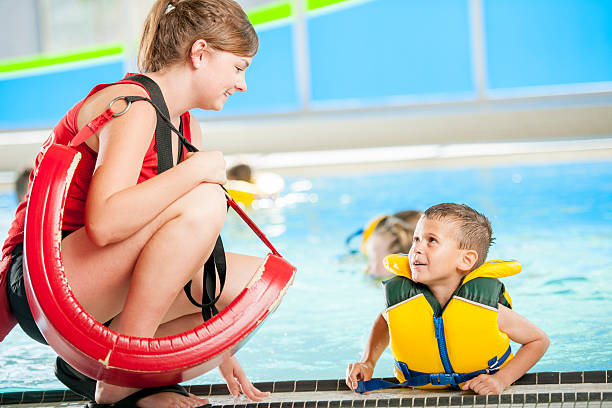The benefits of swimming include:
Health and Fitness:
Swimming is an amazing physical activity for children. Water provides natural resistance, which works and strengthens the large muscles of the arms, legs, and abdominals. The American Heart Association recommends at least 60 minutes of moderate exercise every day starting at age 2, and swimming is a fun way for little ones to meet this important exercise time.
Balance and Coordination:
Water is a unique place for balance development, because little ones' body positions are constantly changing, and in ways, they simply don't experience outdoor play! Swimming also involves body awareness, cross-body movements, and memorizing how to use the body to get from one place to another in the water.
Confidence and independence:
It is common for children to start swimming with a lot of anxiety (especially when it comes to formal swimming lessons). But as they begin to understand the concepts of floating and moving in the water, they will become more comfortable exploring the water. In time, learning to swim will be a great achievement for the little ones.
Security Abilities :
This perk is very important! No parent or caregiver wants to think about the potential dangers of water, but keeping little ones safe around it is essential. In fact, many formal swim programs for young children begin by teaching them what to do if they fall in the water.
Also read me: What Is The Importance Of A Lifeguard?
Swimming Safety Tips
We hope we have convinced you that swimming is a great activity for your little one! But as we mentioned earlier, water can be dangerous. In fact, drowning is the leading cause of accidental death for children ages 1-4. Here's what you can do to keep your child safe when swimming:
Swim lessons: The American Academy of Pediatrics (AAP) notes that children as young as 1 can start swimming lessons, which can reduce the risk of drowning.
Supervision: Always supervise children around bodies of water, even if they are just floating in shallow water, you can hire a lifeguard for this purpose for your child in this procedure American lifeguard events will help you, our courses are lifeguard training near me, lifeguard courses, lifeguard certifications, and pool lifeguarding, etc.
Fenced Pools: Pools must have a safety fence installed around them, with a childproof locked gate. Make sure the area is closed and locked at all times when you are not using it.
Use life jackets instead of flotation devices: A life jacket is a safer option for non-swimmers. Review the life jacket size chart to make sure your child meets the size and weight requirements.
Have your cell phone handy: In the event of an emergency, your cell phone will allow help to arrive as quickly as possible.
Inspect pools: Before each use, you should complete an inspection to ensure that no drain covers are missing, which can create unsafe suction for young children. Also, look for any slippery spots or sharp objects in and around the pool.
With you as their guide, your toddler can play safely in the pool and reap the many developmental benefits of swimming.



.jpg)
.jpg)
.jpg)
.jpg)

.jpg)

.jpg)

.jpg)

0 Comments